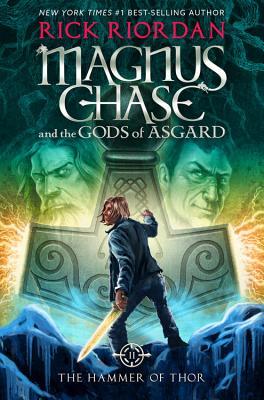"it was just a little death prophecy!" "Blitz . . ." she turned. "You understand there's no such thing as a little death prophecy, right?"
Thor's hammer is missing again. The thunder god has a disturbing habit of misplacing his weapon--the mightiest force in the Nine Worlds. But this time the hammer isn't just lost, it has fallen into enemy hands.
* * *
3 / 5
Better than it's predecessor but still smelling of Percy Jackson with a lick of paint, Magnus Chase and the Hammer of Thor is a decent, fun read. The plot is pretty recycled: something bad has happened (in this case another object has been stolen from a powerful god), our heroes have a very limited time frame in which to get their act together (seriously what is it with like five day quests?), and the humour is same-old, same-old. I laughed a couple of times but it's wearing thin. The Hammer of Thor is shorter than The Sword of Summer, which actually helped quite a lot in keeping me engaged and enjoying it.
Alex is the new kid on the block and part of Riordan's exciting venture into diversifying his books (though Reyna remains my favourite new Riordan character of all time) as a genderfluid child of Loki, which makes lovely use of real Loki lore. Unlike the last book I read with a genderfluid character, thankfully Riordan manages to avoid establishing Alex's identity via further entrenching gender roles/stereotypes. The last one I read went down the "dress = woman, pants = man" route. Ew. He did instead do a bog-standard info dump (rather like Odin and his dreaded motivational and explanatory powerpoints) which was rather clunky and unintegrated, but I appreciated the effort. It also wasn't perfect as there were a couple of instances where Riordan confuses sex and gender.
she thought that if she became an einherji she'd be stuck in one gender forever
How could one be "stuck in one gender" if gender is identity? Surely he means sex. Regardless, Alex is spunky and complete with mysterious, tragic past (TM) that we come to expect from Riordan characters. Alex kind of reminds me of Nico, complete with terrible fashion sense. She (as Alex is mostly addressed as she in this novel, I will do so here) is a pleasant addition to the original quartet, though doesn't actually get a lot of page time as far as I was concerned; she pops up at the start of the book, then returns for the "main" part of the quest. I can kind of see the next books heading in an Alex/Magnus romance direction.
Speaking of romance, Sam's betrothed Amir Fadlan gets a few more appearances and their relationship goes through trials of its own. Sam is clearly besotted with Amir, but he's having trouble reconciling the woman he knows with the valkyrie that she is and the Nine Realms that go with her. They also get a couple of cute scenes and I rather enjoyed this little subplot. Sam herself is pretty much the same as in The Sword of Summer, so if you liked her there you'll like her here. Who we do get a lot more of, however, is Hearthstone, who is one of my favourite characters. We get a bit more of him being a badass mage, some really emotional and revealing scenes about his past, and all round more fabulous Hearthstone.
The big bad of this book is Loki, and I really wasn't a fan of it. First off, Loki was floating in and out of the last book and I was hoping to see a new villain. No luck. Further, I'm not quite sure where Riordan is getting this Loki, God of Evil from: god of trickery and mischief, sure, but evil? He's gone down the same route as Marvel's Loki and its completely lacking in depth. Once again I refer anyone interested in a sophisticated exploration of Loki to read Gratton's The Weight of Stars. More generally, I'm not a fan of Riordan's writing of gods in general. I think this quote really sums up his whole attitude and its one that really doesn't cut it for me:
"Frankly, I don't think of us as gods, either. There's hard to see much divinity in my family"
The ending is decent, building up to an obvious route for the next book to take. There's also the reappearance of Annabeth and there's a rather large insinuation that her and Percy will be making a large appearance in the next book. I'm not really sure how I feel about this: on the one hand I love Percy and Annabeth, on the other it feels like a cheap marketing ploy to attract readers and smacks of inability to make Magnus and his crew interesting enough to fill another book.
Either way, The Hammer of Thor is a decent read which is better than The Sword of Summer, but it fails to deviate significantly from the template that Riordan has been using for a rather large number of books now.
Either way, The Hammer of Thor is a decent read which is better than The Sword of Summer, but it fails to deviate significantly from the template that Riordan has been using for a rather large number of books now.


No comments:
Post a Comment